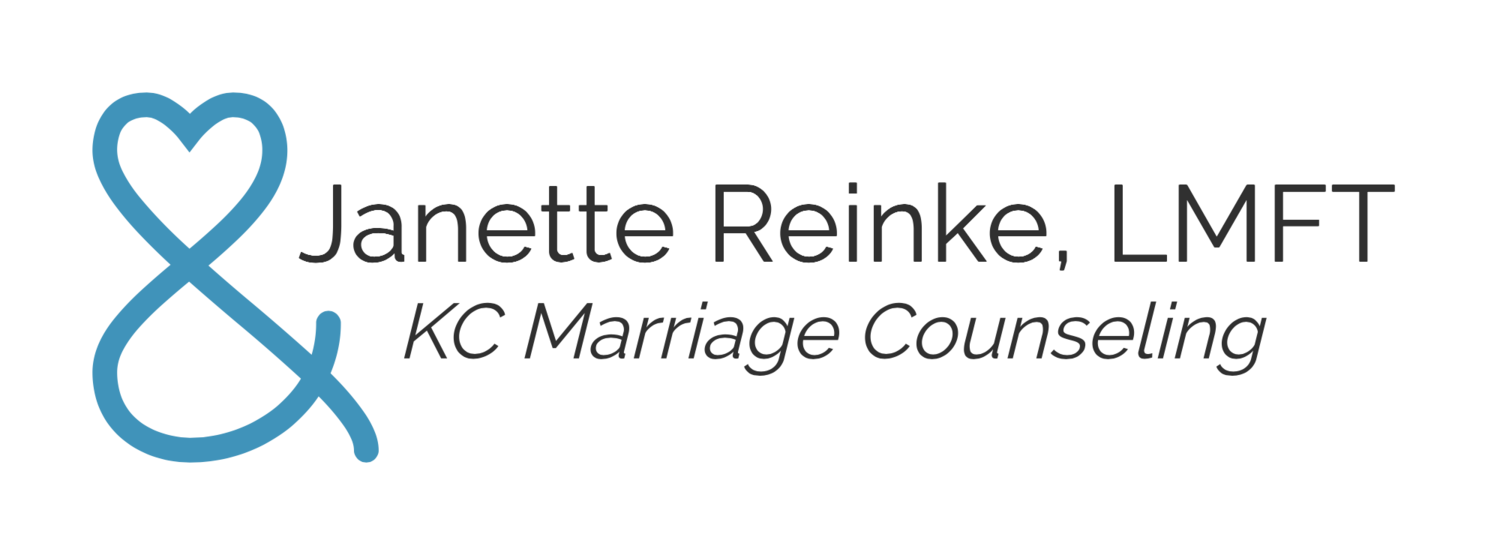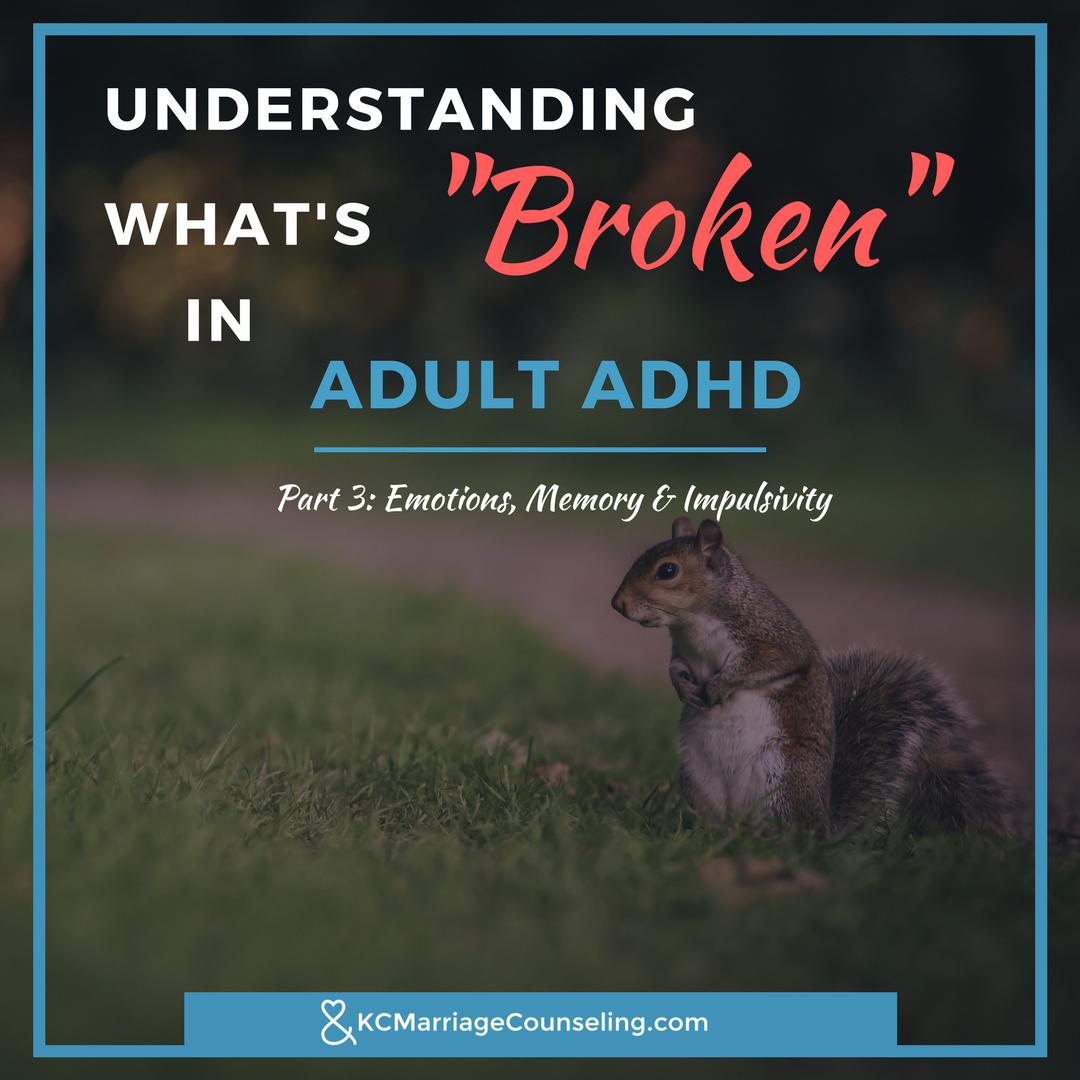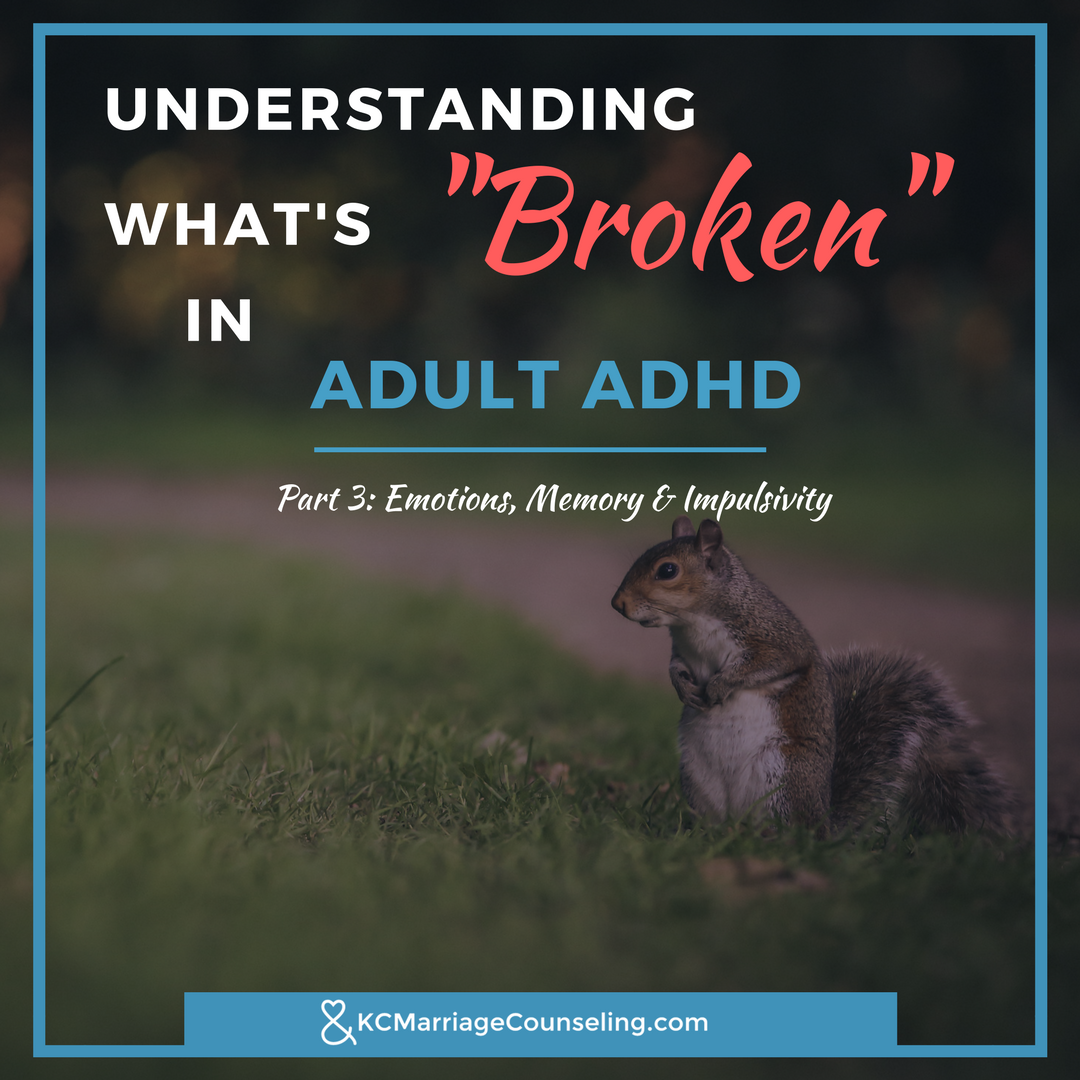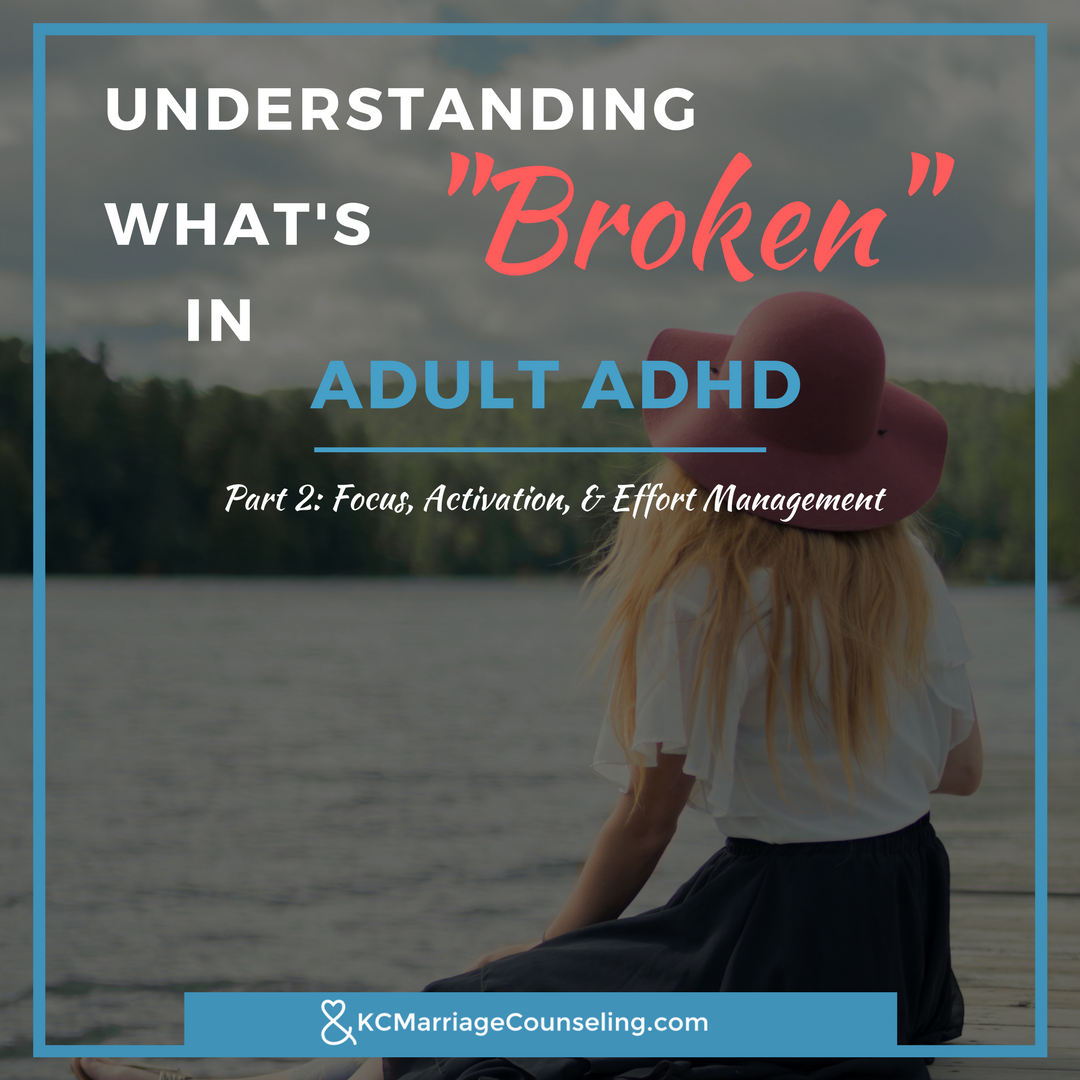Today is the last installment of the quickie overview of Executive Functions and how they are “messed up” in the ADHD brain. Keep in mind that when I say “messed up” or “broken”, I don’t mean that YOU are messed up or broken. Those words aren’t judgements - just descriptors that an ADHD brain works differently and some of those differences DO get in the way of optimal functioning in your life.
For Part One - Click Here
For Part Two - Click here
To Review, the 6 Executive Functions impaired in ADHD
- Task Management (Activation) - Prioritizing, organizing and initiating activity
- Attention Management (Focus) - Focusing, sustaining, shifting attention to different tasks
- Effort Management - Alertness, sustaining effort, managing energy, and processing speed
- Emotion Management - Managing frustration, modulating and regulating emotions
- Information Management (Memory) - Using working memory and accessing recall
- Action Management - Monitoring, inhibiting, and self-regulating action
4. Managing Emotions with ADHD
Managing Frustration, Modulating & Regulating Emotions
What this looks like:
- Short fuse - low threshold for frustration
- Difficulty regulating emotions
- Can be easily overwhelmed by emotions such as anxiety or depression
- Difficulty with emotional sensitivity
- Inappropriate emotional responses
- High attraction to “drama”
Pros: Tendency to be incredibly empathetic, and can be very attentive to friends and family. When emotions are befriended and tools to learn how to manage the normal ups and downs of emotions, can channel one’s sensitivity and empathy to be helpful in relationships.
Cons: Can negatively impact relationships by not being able to slow down emotional reactions. Can hurt others through quick reactions to emotions and “blowing up”. Others around you feel like they are walking on eggshells
Example Strategies to help with Emotion Regulation:
- When you feel intense emotions - positive or negative - you must slow down, and either work through the emotion or distract in a healthy way from the emotion. This is something that I work with many, many clients to help them to do.
- Give yourself a time-out to breathe and slow down the moment - so that you can choose how to respond to the emotion instead of a quick, impulsive reaction.
- Put your emotion into words (write the words down, or say them out loud) - this helps to “contain” the emotion so that they don’t feel like they are going to consume you.
- Deep breathing - breathe in to a count of 4, out to a count of 8 - using your diaphragm (expand your stomach like a balloon when you breathe in)
- Exercise - 10-30 minutes of exercise that raises your heart rate, every day, or as many days a week as possible can help you regulate your mood and does wonders for anxiety.
There are MANY, MANY other strategies for working with and regulating emotions - if you need help, ideas or support with this, contact me - working with emotions is one of the most important things I do to help clients, individually or as a couple.
5. Why did I walk into this room again? or... Information Management (Memory)
Using Working Memory and Accessing Recall
What this looks like:
- Difficulty holding one piece of information in mind while working on another - such as “I need to manage my finances now so that I can buy a house three years from now”
- Squirrel syndrome - You need to keep in mind why you went to Target, but when you walk in you are distracted by the dollar section and completely forget why you went to Target in the first place (not that *I’ve* ever done this.) :-)
- Out of sight, out of mind - this is why putting things away, where they belong, can often mean “losing” something because it is out of sight, you forget it exists. This is also why you pile things up, instead of file things. If they are filed away, you forget this important document even exists, so you leave it out, and then leave more important stuff out, until you have piles and clutter. This is also why filing stuff away might not actually be the correct solution for you.
Pros: The tendency to forget can actually be a positive in relationships as you tend to not hold a grudge - you let go of minor upsets more easily because you simply don’t remember to hold the grudge (bigger upsets, obviously are different for many people)
Cons: Can appear “flighty” or some people even think “stupid” - it isn’t, by the way. Difficulty remembering things has nothing to do with your intelligence or ability.
In relationships, can also come across as you don’t care about the other person because they think that you don’t care enough to remember to do something you said you’d do. This is one of the most common complaints of couples in my office. Partners tell me that they don’t feel like they are even on their loved one’s to do list, or that they are a priority enough to remember - they take it personally. It isn’t personal, or malicious that you forgot that thing you said you’d do - AND AT THE SAME TIME you ARE sending that message whether you mean to or not, so this MUST be addressed.
Example Strategies for Memory Problems in ADHD:
- Use an “external brain” or memory system - such as a notebook, or a note on your phone, etc. Put EVERYTHING in there, and then set a reminder or develop a strategy to look at the book at least once every day.
- Utilize calendars, reminder systems, alarms, post-it notes, visual organizing systems.
- Make and use checklists - even for the simples things - like you might use for kids. Such as a checklist for when you leave every morning. A before bed checklist. A chore checklist. Put all of your routines into a visual, checklist form. You aren’t stupid for needing to do this, and you aren’t a “child” because you are using a system that works well for kids. You are an adult taking responsibility because you are using a system that works for people that have a hard time remember things.
- Put bills and other things that can be automated into “automatic mode” - such as direct debit bill pay, or (Seriously? I had another example here, and after 10 minutes of sitting here, I can’t remember it. LOL!) --- Oh! I remembered! Put your savings on automatic - have money automatically transferred from your checking to savings account each month, or for investments, etc.
6. Action Management - The "H" in ADHD
Monitoring, Inhibiting, and Self-Regulating Action
What it looks like:
- Hyperactivity
- Impulsivity
- Not knowing when to act or not act
- Interrupting
- Not knowing when to speak or not to speak
Pros: Spontaneity can be fun and open you up to new ideas and experiences. Your fun-loving attitude and drive for new experiences can be attractive to others.
Cons: Can seem rude, all over the place, clumsy, or socially awkward. Can lead to overcommitment, stress, and difficulty with relationships.
Example Strategies to help with Impulsivity and Hyperactivity:
- Use mindfulness tools such as “observe and describe” your current state, thoughts, emotions - without judgment.
- Exercise and yoga are good for slowing down your mind and thoughts.
- Fidgeting.
- Deep breathing, as described above.
- Writing down your thoughts and emotions before you allow yourself to act on them. If you are interrupting because you are afraid that you will forget what you want to say, use your little notebook to write it down. If it is important, you can wait to say it, and if it is in your notebook, you won’t have to interrupt to say it before you forget.
- Give yourself a brain, or physical break - being tired either mentally or physically can get in the way of your ability to control your self or your actions.
- Agree on a code word, such as “bubble gum” or “snuffleupagus” that your partner can say to you, without judgment, as a reminder or alert that you are interrupting or not being considerate. The code word can be an alert to you that you need to employ a strategy such as write it down, or take some deep breaths - when you didn’t realize that you needed to use a strategy.
Again, these last few posts are only the tip of the iceberg of the struggles of people with ADHD/ADD and Executive Function difficulties. And the strategies are only a tiny fraction of what you can do to help manage these problem spots.
Here is the thing NOT TO DO: Nothing.
Please don’t do nothing.
Do something. Get help.
You don’t have to settle for struggling with this forever. You might be feeling overwhelmed at all of this information. Or you might be feeling discouraged by how hard life seems for you and so much easier for everyone else.
These feelings are normal.
There is hope, even if it doesn’t feel like that.
You don’t have to stay stuck in the overwhelm forever. Your next step is to get help. You can ignore all of these strategies and take one step - get help. Contact me, or find a therapist who can help you. Getting the right treatment is so important, and you DO deserve it.
If you'd like more information now, I suggest "Parenting ADHD Now" by Elaine Taylor-Klaus & Diane Demptster of Impact ADHD. (Where I found these great explanations and list of executive functions above) Even though the books says it is about parenting with ADHD, I find that the explanations in this books are very, very good, and many of the tips for kids with ADHD are simple and uncomplicated and work AWESOME for adults with ADHD.
What would you add to each of the above 3 Executive Function Deficits? Do you related to any of these? Do any of these get in your way? Do any of these deficits cause problems in your relationships or marriage?
If you would like to learn more about Executive Functions and how they might be a problem for you, would like support or accountability to help you make changes, or are feeling just plain lost and hopeless that you’ll never be able to change, contact me. There is help for you! Individual or group counseling might be just the thing you need - you aren’t broken! You aren’t messed up. You just need some help - which is ok. It is ok to need help and support.
If you are wanting help and/or support with your ADHD, managing Executive Functions or dealing with Time blindness, and are in the Kansas City area, I suggest joining the Adult ADHD Treatment group - a weekly meeting of adults with ADHD to help you finally get (stuff) done.
Automate receiving these blog posts directly to your email. Subscribe below!
More posts you might find interesting...














Quick tip for Adults with ADHD - Use a Did It list when you are struggling with your To Do list, feeling overwhelmed, or stuck.